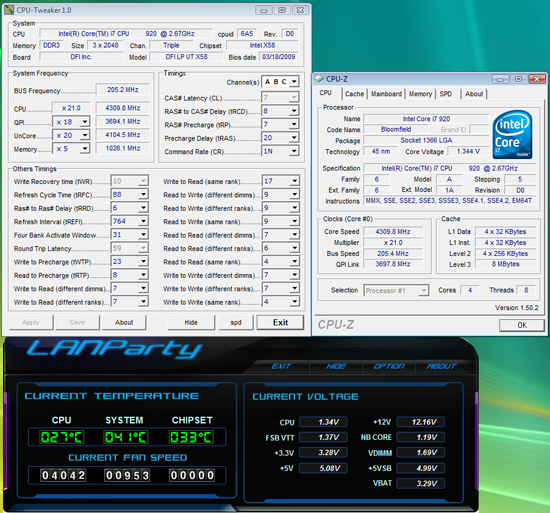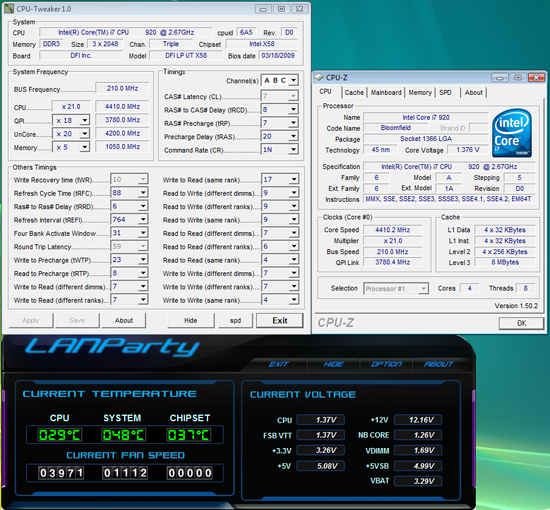Intel Core i7 920 D0 Stepping - Preview
by Gary Key on April 6, 2009 11:30 AM EST- Posted in
- Gary's First Looks
We received our first Core i7 920 D0 stepping from ASRock a few days ago and have been testing it thoroughly on their X58 SuperComputer Motherboard outfitted with four GTX 260-216 video cards. This new stepping certainly shows promise as initial clocking, voltage levels, and memory speeds were improved for the most part over our best C0 stepping. However, the differences were not exciting enough for us to immediately whip out the credit card and go hunt down a D0 stepping processor. In the middle of our testing, ASRock provided an updated BIOS tuned with the D0 stepping in mind and the results changed enough for us to seek a retail processor. Our ES sample was good, not as good as some hand picked samples we noticed at various forums back in March, but we wanted a retail processor.
We called up our good friends at TankGuys and they were able to hook us up (after our credit card cleared) with two D0 stepping 920 processors. Ben was able to overnight the first unit in time for us to test over the weekend and our initial results have just been terrific to date. Unfortunately, our ASRock X58 board (yes, this board makes for a very good multi-GPU platform) was tied up in testing for an upcoming Workstation review. So looking around the lab, we grabbed our trusty DFI LanParty UT X58-T3eH8 and updated it with the latest magical mystical BIOS from Oskar, Jarry, & Company. This particular BIOS is very D0 stepping friendly along with incorporating a few changeable settings like Round Trip Latency (RTL) that allows us to clock our Corsair Dominator GT memory kit a little higher than the other X58 motherboards.
The first test results just blew us away and we wanted to share one particular result today. We are still testing and will have a full article up in the near future featuring a variety of motherboards and cooling choices, but at this moment, the D0 920 stepping provides real and tangible benefits for the overclocking community over the previous C0 steppings. There is no difference in application benchmarks between the two processors at stock or like overclocked settings, nothing drastic has changed like cache levels or the IMC design. Rather this is a "standard continuous process improvement" update as Intel officially informed us. These improvements have enabled us to achieve higher overclocks at like or lower voltages, higher memory speeds at like or lower voltages, and as a result, our CPU, PWM, and case temperatures are down while overclocked numbers are up. Until we finish up our testing, the screenshot below is one example (not even our best) of our test results with the Core i7 920 D0 (3845B027 lot code) processor.

We enabled Turbo mode on all four cores for a final 21x CPU multiplier, set Bclk to 205, memory ratio to 2:10, Core VID at 1.345V, VTT to 1.37V, IOH to 1.19V, and VDimm at 1.69V. This resulted in a final CPU speed of 4.309 GHz, memory speed at 2052 with 7-8-7-20 1T timings, and it is 24/7 stable. We actually could reduce Core VID to 1.30V, VTT to 1.34V, and VDimm to 1.67V and pass our OCCT/Prime 95 tests. However, at the reduced voltage rates our video encoding tests with RipBot264 or HandBrake would fail along with our trusted Crysis WarHead and PCMark Vantage x64 loop testing. We think we can reduce the voltages slightly from their current settings and still pass our benchmark test suite, but for now we feel safe with our results.
The question that has not been answered yet is how our C0 processors steppings faired. First off, none of the C0 steppings we have would operate at these particular voltage settings, in fact two of them failed to POST. Our best C0 sample is requiring 1.425V on Core Vid, 1.250V IOH, 1.475V VTT, and 1.71V VDimm to just make it into Vista Ultimate 64 and we still have not dialed in application stability yet. Once we complete the C0 testing, expect to hear back from us on this new/old processor.

We just passed the eight hour test mark (multi-tasking tests, OCCT, PCMark Vantage x64 loops) with the above setup. Once again, we set our CPU multiplier to 21x for all cores, Bclk at 210, 2:10 memory ratio, and voltages set to 1.376V on Core Vid, 1.37V VTT, 1.26V IOH, along with 1.69V on VDimm. This results in a 4.41GHz clock speed and DDR3-2100 memory speed at 7-8-7-20 1T timings.
We will be back shortly with results on the ASRock X58 SuperComputer board with a new performance level BIOS as our workstation testing with it is now complete.
















51 Comments
View All Comments
BLHealthy4life - Sunday, May 24, 2009 - link
I have this DFI board and I cannot get the 21x Multiplier to activate. I have read everything on the net about it and have enabled/disabled this and that as well as have the performance profile set in Windows.I didn't have a problem with the 21x on my R2E because it was a multiplier in the menu that I could enable regardless of any other setting....what is with DFI and not having this option???
BL
rsabluebulls - Wednesday, May 20, 2009 - link
i wonderwhat cooler or water cooling did they use when they did this test... 27-29 degrees idle @ 4ghz is quite impressive. i have an i7 D0 chip with a TRUE heatsink and fan and my 3.5Ghz overclock idles at 40 degrees and 69 on 100% full load (running RipBot)...jeffreaux2 - Friday, April 24, 2009 - link
I recieved a Core i7 920 yesterday from Newegg. It is also the DO stepping version. SLBEJ.claytontullos - Thursday, April 23, 2009 - link
A i7 that I ordered from newegg arrived today and it is S-spec: SLBEJ.thebeastie - Tuesday, April 14, 2009 - link
So when can we bloody buy one?This is the only thing that is holding me back from buying a PC
ap90033 - Friday, April 17, 2009 - link
I cant wait for the OC guide for this... I have the Vigor Monsoon III with the 920 Rev D0 on an EVGA X58 Board so I am Ready... :)Beno - Thursday, April 9, 2009 - link
please use core temp or proper software for cpu tempsdavision - Thursday, April 9, 2009 - link
I thought I read in numerous places that going above 1.65 was a real no-no with these i7 boards.What am I missing?
Pedros - Thursday, April 9, 2009 - link
Well, each cpu is a cpu ...i have a C0 stepping that can do 3.8Ghz stable at 1.28 ... at 1.27 it BSOD's ... if i use OCCT it's stable, if i use prime it BSOD's...
So, it really depends of lots of factors...
This new D0, if you notice are the batch ****B**** ... in the C0 we already knew that the B batch was awesome, could overclock better, with less vcore that results in less temperature ... so this D0 is basically the best batch of the C0 but as "mainstream".
Gary Key - Wednesday, April 8, 2009 - link
The screenshots provided utilized the CoolIt Systems Freezone Elite and I can go higher with it. The "short" review I am working on now will show the CoolIt Domino and the Vigor Monsoon III coolers, hopefully I can have the retail cooler results finished also.I am at 4.3GHz on both of the those coolers and just passed the 24 hour mark of our test suite. At this point I believe the settings we used are 24/7 stable and have started doing the individual tests for the review. However, I think 4.2 at 1.31V probably provides a better margin of safety on air and will probably recommend that setting. Both of our retail processors performed identically in the testing. I have another retail unit arriving today that I will check quickly this evening.